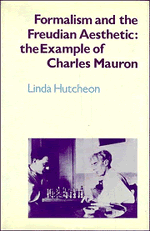Book contents
- Frontmatter
- Contents
- Preface
- Acknowledgments
- Introduction
- Part I The critical formation: science, formalism, and aesthetic contemplation
- Part II Psychoanalysis and literary criticism
- 5 Scientific psychology and art
- 6 Psychoanalysis and psychocritique
- 7 Psychocritique: formalism, science, and the value of problems
- 8 Psychocritique and the modern French critical context
- Conclusion
- Appendices
- Notes
- Index
8 - Psychocritique and the modern French critical context
Published online by Cambridge University Press: 12 January 2010
- Frontmatter
- Contents
- Preface
- Acknowledgments
- Introduction
- Part I The critical formation: science, formalism, and aesthetic contemplation
- Part II Psychoanalysis and literary criticism
- 5 Scientific psychology and art
- 6 Psychoanalysis and psychocritique
- 7 Psychocritique: formalism, science, and the value of problems
- 8 Psychocritique and the modern French critical context
- Conclusion
- Appendices
- Notes
- Index
Summary
La critique de l'auteur est en somme une sémiologie qui n'ose pas dire son nom.
roland barthesMAURON'S LITERARY BACKGROUND, such as it was, had been formed primarily outside the dominant French aesthetic tradition of his time. Among the reasons for his continued anomalous position, however, were his early scientific training, the formalist influence of Roger Fry, and perhaps even his own blindness. As Mauron and Fry discovered at the Pontigny conference in 1925, the French perspective on aesthetics at that time was largely metaphysical. It was against this view that Mauron's early pronouncements were directed. Aesthetics should become, he had argued, a branch of psychology (1970a [1935]: 17). It should be empirical and objective, and not abstract, generalized, or reduced to value judgments. Yet in the philosophical French tradition, aesthetics definitely involved the question of values. It was an inquiry into beauty and its ideals. Within this tradition, Mauron at first stood out, isolated in his early positivist and formalist investigation into aesthetic creation and response. After that middle period, characterized by a questioning of science in the face of the brutalities of modern war and also by a turning to mysticism, Mauron found in psychoanalysis an orthodoxy that made sense of his personal split allegiance to art and science, but again, his choice of creed was not a very popular French one to make at that time.
- Type
- Chapter
- Information
- Formalism and the Freudian AestheticThe Example of Charles Mauron, pp. 163 - 184Publisher: Cambridge University PressPrint publication year: 1984



